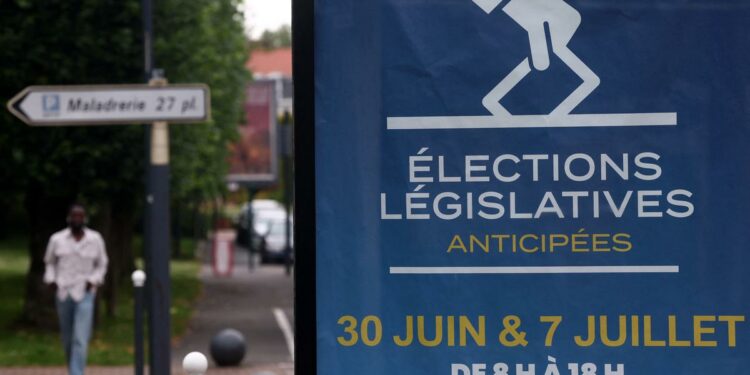The far-right swing in European Parliament elections | Explained
Why did Mr. Macron take such a reckless gamble? He justified the surprise snap-election call as the “most responsible solution”. But a columnist for the popular French newspaper, Le Monde, even described Mr. Macron’s decision as a “choice to play France at poker”. However, was Mr. Macron hoping that moderate and progressive voters would use their strategic voting to counter the ultra-right and maybe undo some of the damage to his party, at least in the second round? Nonetheless, in the first round of France’s snap two-round general election on June 30, the RN raised its vote share to 34% from its historic high in the EU elections. In third place, well behind the 28% vote share of the New Popular Front (NPF), an alliance of left-wing and progressive parties, lies Mr. Macron’s centrist “Ensemble” or “Together” alliance with 21%.
Editorial | Right turn: On the European Parliament elections
Thus, has Mr. Macron allowed the far-right to capitalise on the momentum created by the European elections? Did he incur an unwarranted and hazardous risk by assuming that the latent political turmoil that has been hurting France and Europe for years will explode into a major crisis? It is possible that France may soon find itself in uncharted territory, where far-right political groups not only become more mainstream but also become the most powerful political force in the country.
Growth of the far-right
The far-right is becoming more influential in resistance to the immigrants from Africa and Asia who are expanding their foothold throughout Europe, which is partly a carry-over effect of their colonising legacy. Although this has been going on for decades, it has gained momentum recently. This long-standing issue in French society was portrayed in the novel Soumission (Submission, in English), by French poet and author Michel Houellebecq in 2015. In the novel, the Socialist Party teams up with the recently established Muslim Brotherhood Party in the 2022 French presidential elections to oppose Le Pen, with additional backing from the right-wing Union for a Popular Movement. Following the election of Mohammed Ben-Abbes as president, Islamic law was instituted in France. Although some real-life politicians, such as Le Pen and François Hollande, are the characters in Soumission, there is nobody like Emmanuel Macron in the novel. In fact, Mr. Macron would launch his party “En Marche” in 2016 and run for the presidential election in 2017. Certainly, Houellebecq could not have imagined such a fairytale. Furthermore, Mr. Macron’s centrist politics would effectively quell the far-right wave — at least temporarily. But for how long?
Houellebecq came up with another novel in 2022 titled Anéantir (Annihilate, Destroy, or Obliterate). It was written against the backdrop of the 2027 French presidential election, when the departing young President, who is similar to Mr. Macron, was finishing up his second term in office. In Anéantir, a youthful far-right contender is dangerously close behind the front-runner in the polls in 2027.
The far-right is undeniably riding on popularity throughout Europe. Italy elected Giorgia Meloni as its first far-right leader since Benito Mussolini in October 2022, precisely a century after Mussolini took power. From Sweden to Portugal, Germany to Spain, and the Netherlands to Austria, the far-right is spreading its tentacles. Furthermore, they undoubtedly share certain things in common in terms of their anti-immigration and euroscepticism.
Immigration, eh? French football’s succession of megastars of African, Arab, or Antillean descent, including Kylian Mbappé, Thierry Henry and Zinedine Zidane, represents only one side of the story. However, what is their level of integration into French society? French footballer Karim Benzema effectively summarised this fact when he remarked, “If I score, I’m French… if I don’t, I’m an Arab.”
Needless to say, the two rounds of French elections could turn out to be a change-point in both French and European history if the far-right wins on July 7. This could lead to the emergence of neo-fascism throughout Europe. But as history has shown us, every storm eventually calms down, and this ultra-right wave in Europe will eventually normalise. However, the effects of this particular cyclone would last for a very long time.
Atanu Biswas is Professor of Statistics, Indian Statistical Institute, Kolkata
This is a Premium article available exclusively to our subscribers. To read 250+ such premium articles every
month
You have exhausted your free article limit.
Please support quality journalism.
You have exhausted your free article limit.
Please support quality journalism.
X
You have read {{data.cm.views}} out of {{data.cm.maxViews}} free articles.
X
This is your last free article.
Source link : https://www.thehindu.com/opinion/op-ed/the-spectre-of-neo-fascism-that-is-haunting-europe/article68372013.ece/amp/
Author :
Publish date : 2024-07-05 18:38:00
Copyright for syndicated content belongs to the linked Source.



